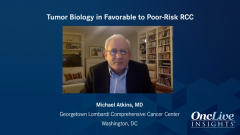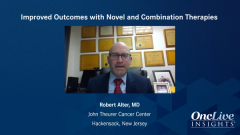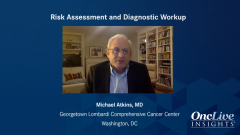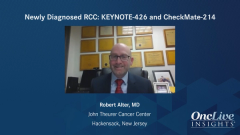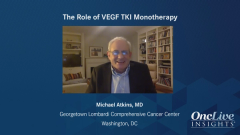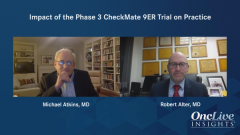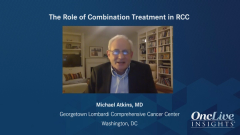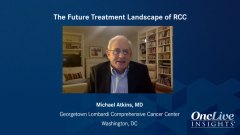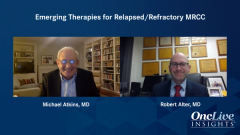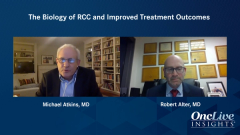
The Biology of RCC and Improved Treatment Outcomes
Episodes in this series

Michael Atkins, MD: Good day, everybody. Welcome to this OncLive® Insights® discussion, “Emerging Strategies for Renal Cell Carcinoma.” I’m Dr Michael Atkins. I’m the deputy director of the Georgetown-Lombardi Comprehensive Cancer Center in Washington, DC, and I’m a medical oncologist with a long-standing interest in melanoma, kidney cancer, and immunotherapy. I’m here today with Dr Bob Alter.
Robert Alter, MD: I’m Bob Alter, a medical oncologist and co-division chief of the Division of Genitourinary Malignancies at the John Theurer Cancer Center in Hackensack, New Jersey. We’re going to start today discussing the biology of renal cell carcinoma [RCC], and we’re going to have a nice conversation about the past, present, and future of renal cell carcinoma.
The most common histology of renal cell carcinoma is clear cell renal cell carcinoma, comprising about 75% of histologies of patients we see with renal cell carcinoma. There’s an increased awareness of the complexity of clear cell renal cell carcinoma, which has multiple molecular profiles, each with unique biologic properties.
Sporadic clear cell renal cell carcinoma is associated with a loss of function or alterations of the VHL gene, which is a tumor suppressor gene, and this is characterized by neoangiogenesis and upregulation of the hypoxia-inducing factor [HIF].
The wild-type VHL protein functions as a ubiquitin ligase participating in the degradation of half the patients bearing VHL alterations, resulting in high levels of HIF and resulting in the upregulation of VEGF. VEGF activates VEGFR, triggering the PI3K-AKT signaling cascade: downstream mTOR is activated, which leads to transcription of a variety of tumor-promoting factors, resulting in increased cellular migration and angiogenesis.
We have found several drivers of tumor progression, including VEGFR, other transmembrane receptors that may potentially drive metastases, including MET and AXE2, that we found more recently. Through these studies we have found therapeutic developments of anti-VEGF and anti-mTOR agents that have led to treatments for RCC. This has also improved our understanding of T-cell biology and has defined the role of immune checkpoints in curbing immune responses to prevent autoimmunity while simultaneously allowing tumor growth escape. This led to the development of immune checkpoint inhibitors designed to remove the breaks on immune inactivation against tumors. Through this science, dating to even the 1990s and the development of agents then, we’re now moving forward, which is hopefully leading to better treatments for our patients.
Michael Atkins, MD: That’s a good description. We’ve probably been working for 2 decades with a toolbox that includes anti-VEGF or antiangiogenic agents, with things such as sunitinib, pazopanib, axitinib, and more recently cabozantinib and lenvatinib. Potentially coming soon would be tivozanib, mTOR inhibitors such as everolimus and temsirolimus, and immunotherapies with interferon and high-dose IL-2, with kidney cancer being the disease where high-dose IL-2 was first FDA approved. What we’ve seen over the past decade is the increasing emergence of checkpoint inhibitor immune therapy with anti–PD-1 and anti–PD-L1 pathway blockers finding their way into the treatment algorithm and moving to combinations of either checkpoint inhibitors or checkpoint inhibitors with anti-VEGF agents as doublets as the preferred frontline treatments.
Transcript Edited for Clarity


